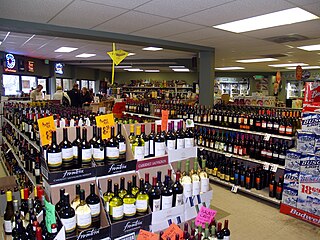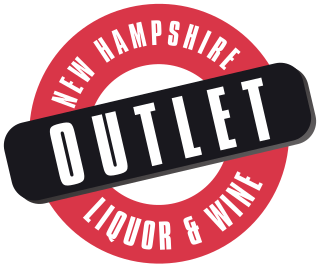
A liquor store is a retail business that predominantly sells prepackaged liquors, wine or beer, usually intended to be consumed off the store's premises. Depending on region and local idiom, they may also be called an off-licence, off-sale, bottle shop, bottle store or, colloquially, bottle-o, liquor store or other similar terms. A very limited number of jurisdictions have an alcohol monopoly. In US states that are alcoholic beverage control (ABC) states, the term ABC store may be used.

The Oregon Liquor and Cannabis Commission (OLCC), formerly known as the Oregon Liquor Control Commission, is a government agency of the U.S. state of Oregon. The OLCC was created by an act of the Oregon Legislative Assembly in 1933, days after the repeal of prohibition, as a means of providing control over the distribution, sales and consumption of alcoholic beverages. To this end, the agency was given the authority to regulate and license those who manufacture, sell or serve alcohol. Oregon is one of 18 alcoholic beverage control states that directly control the sales of alcoholic beverages in the United States. In 2014, the passage of Oregon Ballot Measure 91 (2014) legalized the recreational use of marijuana in Oregon and gave regulatory authority to the OLCC.
Alcoholic beverage control states, generally called control states, less often ABC states, are 17 states in the United States that have state monopoly over the wholesaling or retailing of some or all categories of alcoholic beverages, such as beer, wine, and distilled spirits.

The Texas Alcoholic Beverage Commission, or TABC, is a Texas public agency responsible for regulating, inspecting, and taxing the production, sale, and use of alcoholic beverages within the state. The agency was established in 1935 and is headquartered in Austin.

The California Department of Alcoholic Beverage Control (ABC) is a government agency of the state of California that regulates the manufacture, distribution, and sale of alcoholic beverages.

The New Hampshire Liquor Commission is a government agency of the U.S. state of New Hampshire. The commission regulates the sale of alcoholic beverages in New Hampshire, one of 18 alcoholic beverage control states.

A liquor license is a governmentally issued permit to sell, manufacture, store, or otherwise use alcoholic beverages.

The Delaware Division of Alcohol and Tobacco Enforcement (DATE) is a law enforcement agency of the State of Delaware and is a division of the Delaware Department of Safety and Homeland Security (DSHS).
The Virginia Alcoholic Beverage Control Authority is one of the eleven public safety agencies under the Secretariat of Public Safety and Homeland Security for the Commonwealth. The agency administers the state's ABC laws. ABC stores are the only retail outlets in Virginia where customers may purchase distilled spirits. The profits that Virginia ABC contributes are collected from sales of distilled spirits at ABC stores, taxes collected on beer and wine sales, violation penalties and license fees. Since its establishment in 1934, Virginia ABC has contributed more than $9 billion to the Commonwealth's general fund. Virginia ABC employs more than 4,000 people statewide.

The Division of Alcoholic Beverages and Tobacco (ABT) is the Florida state government agency which licenses and regulates the sale of alcoholic beverages and tobacco. It is part of the Florida Department of Business and Professional Regulation (DBPR).
The Indiana Alcohol and Tobacco Commission is an Indiana state government agency. The aims are:

The state laws governing alcoholic drinks in New Jersey are among the most complex in the United States, with many peculiarities not found in other states' laws. They provide for 29 distinct liquor licenses granted to manufacturers, wholesalers, retailers, and for the public warehousing and transport of alcoholic drinks. General authority for the statutory and regulatory control of alcoholic drinks rests with the state government, particularly the Division of Alcoholic Beverage Control overseen by the state's Attorney General.

Alcohol laws are laws relating to manufacture, use, being under the influence of and sale of alcohol or alcoholic beverages. Common alcoholic beverages include beer, wine, (hard) cider, and distilled spirits. Definition of alcoholic beverage varies internationally, e.g., the United States defines an alcoholic beverage as "any beverage in liquid form which contains not less than one-half of one percent of alcohol by volume". Alcohol laws can restrict those who can produce alcohol, those who can buy it, when one can buy it, labelling and advertising, the types of alcoholic beverage that can be sold, where one can consume it, what activities are prohibited while intoxicated, and where one can buy it. In some cases, laws have even prohibited the use and sale of alcohol entirely.

The serving of alcohol in the Commonwealth of Massachusetts is governed by the Alcoholic Beverages Control Commission (ABCC), which is responsible for issuing licenses and permits for all manufacturers, wholesalers and importers, out-of-state suppliers, brokers, salespeople, warehouses, planes, trains, ships, ship chandlers and vehicles transporting alcoholic beverages.
The production of beer in New Jersey has been in a state of recovery since Prohibition (1919-1933) and the Great Depression (1929-1945). Currently, the state has 123 licensed breweries: a large production brewery owned by an international beverage company, Anheuser-Busch InBev, and 122 independent microbreweries and 19 brewpubs. The growth of the microbreweries and brewpubs since the 1990s has been aided by the loosening of the state's licensing restrictions and strict alcohol control laws, many of which were a legacy of Prohibition.

The production of distilled spirits in New Jersey has not been a large industry in the state. Strict alcoholic beverage control laws in place during and after Prohibition (1919–1933) prevented the industry from growing for almost a century. In 2013, the state passed a law creating a craft distillery license. and issued the first new distillery license since Prohibition to Jersey Artisan Distilling.
Larkin v. Grendel's Den, Inc., 459 U.S. 116 (1982), was a United States Supreme Court case dealing with the enforcement of liquor laws by a non-government entity. Massachusetts had established a law that allowed any church or school located within 500 feet (150 m) of an establishment seeking a liquor license to object to that license. The Supreme Court, in an 8–1 decision, ruled that Massachusetts' law violated the Establishment Clause as it delegated powers normally reserved to the government to non-government entities, and would allow decisions to be made along religious lines, effectively advancing religious purposes.











